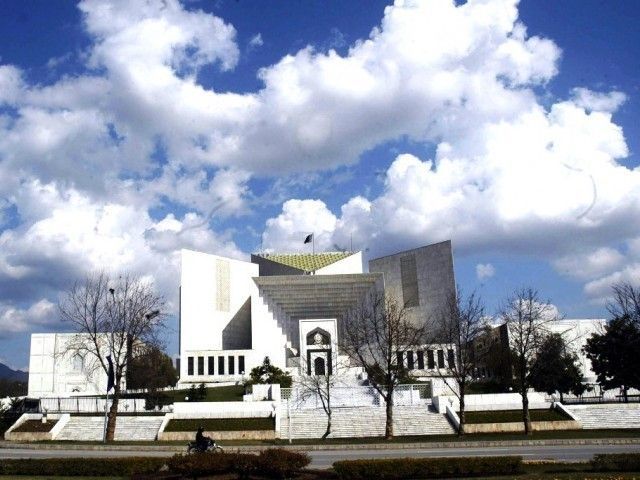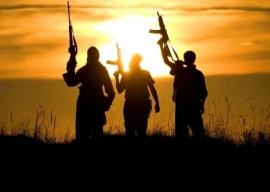
The Supreme Court has given a big relief to the country’s security establishment by conditionally allowing the trial of 104 May 9 rioters—mostly PTI workers and supporters—in military courts.
Superior bars—the Pakistan Bar Council and the Supreme Court Bar Association—have not yet commented on the interim relief order, whose reasons are still awaited.
However, a large number of lawyers including PTI supporters are criticizing the five judges for suspending the court’s October 23 judgement that declared the trial of civilians in military courts as unconstitutional.
The order will affect high courts which are dealing with the case related to May 9 rioting. Now high courts cannot grant relief to five female females who are in jail after May 9 incidents.
The order has also dampened the hope of PTI which is seeking rescue from the Supreme Court against state institutions actions after May 9 incidents.
The composition of this six-members larger bench is also interesting.
Vocal judges who have strong opinions about the matters related to civil liberties were not included in the bench which comprises judges with conservative opinion about legal issues.
Justice Musarrat Hilali is an exception to the rule, and the judge dissented from the majority opinion and voted against suspending the SC’s October 23 judgement.
Since taking charge as the chief justice of Pakistan (CJP), Qazi Faez Isa has been showing restraint in matters related to security establishment and the latter has not faced any hurdles in its actions related to the May 9 incidents.
Justice Isa’s predecessor, Umar Ata Bandial was regarded as a pro-establishment judge. However, he had not endorsed trials of civilians in military courts.
The SC has not so far entertained petitions including PTI founder Imran Khan’s letter urging the court to take notice of his party’s alleged persecution; Aitzaz Ahsan’s petition against enforced disappearance of PTI leaders and a petition challenging amendments to the Official Secrets Act, 1923
This shows that the Supreme Court is also taking the May 9 incidents very seriously.
Interestingly, the SC has not so far listed for hearing PTI Vice Chairman Shah Mahmood Qureshi's bail plea in the Cipher case. The plea was filed on November 20 and the matter requires urgency as the Islamabad High Court has directed a special court to conclude the trial within four weeks.
There may be several reasons why the SC led by CJP Isa is not intervening in these matters.
Firstly, high courts are adjudicating these issues. The SC will issue appropriate orders when these cases reach the apex court.
Secondly, unlike his predecessors, CJP Isa does not want political parties to use the SC for their political gains. However, he has listed for hearing a presidential reference seeking revisiting of the Zulfikar Ali Bhutto murder case judgement.
A larger bench will also take up a case related to the life disqualification of lawmakers under Article 62 (1) (f) of Constitution. If the SC ends lifetime disqualification of lawmakers, then former prime minister Nawaz Sharif and IPP party chief Jahangir Khan Tareen will emerge as the verdict’s beneficiaries.
CJP Isa is mainly focusing on correcting the mistakes made by the apex court in the recent past. He is also questioning the roles of the previous establishment during different judicial proceedings. So far the chief justice is not facing any resistance in these cases.
Presently, judicial politics is in full swing in the Supreme Court.
One section of judges who were close to former CJP Bandial are dissenting with CJP Isa on important matters. Letters are being written against each other and these are available on the SC website.
If CJP Isa wants accountability within judiciary as well as judicial reforms, then he requires some support from the executive particularly the security establishment.
Legal opinions
Commenting on the SC’s December 13 order, Former additional attorney general Tariq Mahmood Khokhar said the ad interim decision is a “legal astonisher” even for a nation already mired in constitutional, democratic and judicial ambivalence.
Echoes of a “likeminded bench” make it worse, especially so in an age of declining social deference and trust in state institutions. It bodes ill for an already fractured institution", he added.
Pakistan Bar Council member Muneer Kakar strongly condemned the court order. He said bars in the province of Balochistan would observe a strike against this decision on December 14 [today].
Barrister Salahuddin Ahmed said in order to suspend the October 23 verdict, the appellant must show a prima facie defect in the order. It must also highlight some irreparable harm and inconvenience would follow if the verdict was suspended.
"The five-member bench verdict was correct on merits but, since detailed reasoning is yet to come, [we] can leave that aside for now.
“Justice Sardar Tariq mentioned terror attacks on soldiers. But even without applying the [Pakistan] Army Act, if and when apprehended such terrorists could be arrested under terrorism laws.”
He said the 104 detainees who are presently held in army custody without the right to seek bail clearly face irreparable harm.
“If the original verdict [is] eventually upheld, who will return lost months of their lives. Especially when the attorney general for Pakistan admitted today [that] many of them deserve acquittal due to insufficient evidence.”
He said it is funny that the 104 alleged rioters can only appeal to chief of army staff (COAS) in case of their conviction but Indian spy Kulbashan Jadhav can appeal in a high court if his appeal is rejected by the COAS pursuant to the 2021 law passed for him after International Court of Justice (ICJ) verdict.
Another legal expert, Hafiz Ahsaan Ahmad said the present bench which suspended the SC’s October 23 is the first ever appellate bench constituted under Section 5 of SC (Practice and Procedure) Act, 2023.
He said as the matter was challenged by the federal government and others as a matter of right in appeal, and this way it has the broader scope as compared to the review jurisdiction thus there were bright legal chances of the suspension of the October 23 judgment.
He noted that larger benches of the Supreme Court had validated Section 2(d) (1) (2) and Section 59 of the Pakistan Army Act, 1952.
“The impugned judgment declared these provisions of Military Act as ultra vires of the Constitution and there was no such law existed to cope with the matters of national security breaches and attack on military installations [and] espionage.
“Thus it was imperative to have for the time being suspension of the impugned judgment and to address those areas and people which were beyond the May 9 incidents; to create the deterrence; to apprehend and prosecute those who [are] actually causing or have caused the serious threat or attacked on military installations and on officials,” he added.

1732274008-0/Ariana-Grande-and-Kristin-Chenoweth-(1)1732274008-0-165x106.webp)



1724249382-0/Untitled-(640-x-480-px)1724249382-0-270x192.webp)


1732270499-0/Express-Tribune-(7)1732270499-0-270x192.webp)
1732267715-0/BeFunk_§_]__-(32)1732267715-0.jpg)







COMMENTS
Comments are moderated and generally will be posted if they are on-topic and not abusive.
For more information, please see our Comments FAQ